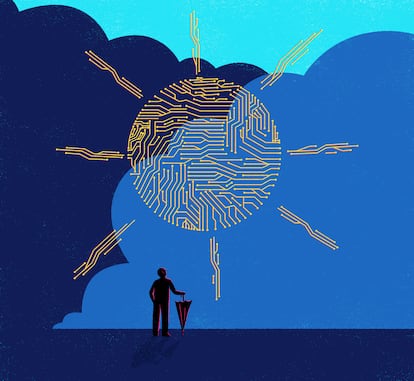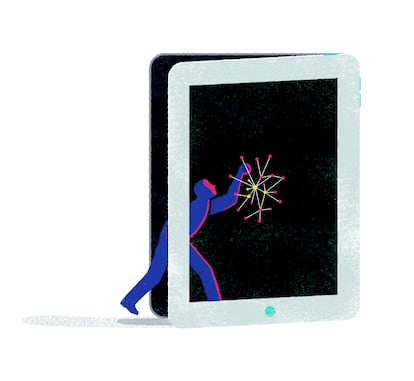Reasons to regain technological optimism
Artificial intelligence systems can free us from boring tasks and give us time to be more creative. But can we really trust technology?

Technological dystopias have been in the spotlight for some years now, to the point that, by now, some people just assume that we will inevitably end up living in an endless episode of Black Mirror. Not without reason: the entrepreneurs and gurus of Silicon Valley promised us a paradise of free knowledge and democracy, and instead we have apps that keep track of everything we do, social networks that brim with conspiracy theories and artificial intelligence systems that could steal our jobs at any moment.
However, despite everything, there is still room for a cautious optimism, like that advocated by authors such as Kevin Kelly, essayist and co-founder of Wired magazine, and philosopher John Danaher, the writer of A Citizen’s Guide to Artificial Intelligence. After all, technology helps us every day to keep in touch with our family when we move to another country, to work from home during a pandemic and to read news from around the world in our pajamas.
It is a critical optimism, one that is aware of the risks and problems posed by every gadget we invent but which does not lose sight of the fact that these innovations have helped us since we lit the first fire, carried grain in the first cart and turned on the first light bulb.
Will AI take over our jobs? You wish!
News about artificial intelligence usually include at least one of two warnings: it will put us out of work and/or kill us all. It is not the usual catastrophism that journalists fall into from time to time; these are actually messages that many engineers and programmers convey. People like Sam Altman, co-founder of OpenAI, who has even said that we must be as careful with AI as we are with nuclear weapons – and that if this technology goes wrong, “it can go very wrong.”
Some reports already claim that this technology will take over 25% of jobs, rendering office workers, architects and lawyers (among others) unnecessary. Still, according to many experts, the most catastrophic scenarios are not likely to happen. Luckily, we are also very far from having an AI that could destroy humanity, either willingly or by mistake.
It also cannot be ruled out that we are exaggerating the possibilities of artificial intelligence, as we have been doing for decades and as cultural historian John Higgs points out in his book The Future Starts Here. Higgs recalls, via email: “Five years ago we were certain that we would already have self-driving cars [the first driverless taxis are just now beginning to circulate the streets of San Francisco]. We had come 98% of the way, they told us, and at the rate at which technology was improving, we were going to solve that problem very soon.” Still, “that 2% turned out to be much more difficult than expected.”
To give another example, ChatGPT is admirable because it writes coherent texts, but it still hallucinates and makes up part of the information it provides, like the time it told EL PAÍS journalist Jordi Pérez Colomé that Spanish Prime Minister Pedro Sánchez has a beard. That last 2% remains unconquered.
Despite everything, 98% is quite good for some tools. The most optimistic observers, like Kelly, state that AI will not steal our work; it will help us with the most boring, mechanical tasks, such as documentation, drafts and editing.
It will be another tool, just like word processors, the telephone or computers, and it will give us time for the creative, fun part of our tasks, just as it has been years since we have had to struggle with a fax machine, or how we can look up practically any information without getting up from our chair. Not to mention that tools such as email and video meetings have made the path towards remote working inevitable, even if some still resist.
However, this cautious optimism does not mean that we should let our guard down. As Higgs recalls, the scenario is very attractive, but it can also give ideas to a CEO who may decide, for instance, that an AI system and a low-paid worker can handle what seven or eight other people used to do, even if the outcome is not as good. In fact, this is one of the problems we have found in the labor market since the digital revolution, as economist Phil Jones explains in Work Without the Worker: more jobs are being destroyed than created.
Not that this is an unsolvable problem: experts such as Higgs or historian Rutger Bregman speak of initiatives with increasing support, aimed precisely at addressing these risks, such as reducing working hours and having a universal basic income, as companies without workers still need clients. Jones himself, highly critical, writes that technology and automation should help us work less and better: our lack of imagination, he points out, is only matched by Silicon Valley’s imaginative efforts to exploit the system’s errors.
Climate change has many solutions
When we talk about technology and optimism, one of the most debated topics is climate change. The most optimistic people trust that we can find a technological solution that will end global warming. However, this may lead to the mistake of thinking that everything we can do now, from recycling plastic to fining polluting companies, is useless, and it is better to just wait for the definitive invention that captures CO2 or reflects sunlight in the atmosphere. The problem, of course, is that this invention may never come.
Danaher reminds us that we must avoid technological determinism. As he explains via email, this mistake involves being convinced that we will find solutions to our problems just because we have always done so. On the other hand, optimism can encourage us to research with the confidence that problems have solutions, without stopping working with the means we currently have. There is no justification for the unwavering faith that technology can solve everything, but there is sense in the confidence that technology, combined with human creativity and collective action, can make the world a little better.
In a similar vein, Higgs advocates “pragmatic optimism”: an optimistic mindset, he points out, will come up with many possible solutions to a problem. Most will not work, but one of them might. For him, this optimism is the most rational, effective and sensible way to act. In fact, he believes that pessimism is as dangerous as blind optimism, as a pessimist will simply assume that we are lost and nothing can be done.
Most likely, technology alone will not solve the problem of climate change: political, economic and social changes will be needed. But also technology. In fact, it is already helping, as in the case of renewable energies.
Your phone, your data
In an article in defense of technological optimism, Kevin Kelly reminds us that the solutions to most problems generate new problems. However, “if we can create 1% more solutions than problems, that 1% compounded over decades equals civilization.”
In this sense, Danaher explains that cautious optimism proposes evaluating technology as a whole. We can conclude that it brings more positive than negative results to our society, although some things are more harmful than beneficial. Nuclear weapons, for instance. It may also be that some specific things, such as digital watches or solar panels, offer a combination of good and bad things, but that the good things have more weight.
There is a good example of this mix of pros and cons right in your pocket: your smartphone, which gives you access to books, newspapers, music and, ultimately, the entire internet. Thanks to map applications, we no longer get lost when we travel. If we don’t know the language, we can translate a menu with apps like Google Lens. And if we are watching a movie at home and cannot remember the name of some actress, we can find it in the time it takes to type the search with our thumbs.

But these apps also collect all the information they can (who we are, where we are, what we do, what we look like) in order to sell as much advertising as they can. As Shoshana Zuboff, philosopher and professor at Harvard Business School, explains in her book The Age of Surveillance Capitalism, this business model is neither inevitable nor immutable, and it can change without affecting the economy: if capitalism has proved anything, it is its ability to adapt, evolve and find a way to make money.
There are alternatives and ideas to protect our privacy and establish legal limits. For example, essayist and virtual reality pioneer Jaron Lanier suggests that we get paid for our data, and James Williams, former Google strategist and author of Clicks Against Humanity, suggests that we get to choose if we want to pay with our attention or with money.
Of course, companies resist regulation and change, as Margaret O’Mara, historian and author of The Code, a book about the origin of the big American technology companies, reminds us. In her opinion, the most utopian techno-optimism arises from a feeling, deeply rooted among these entrepreneurs, about the importance and value of what they are building, which is also linked to their rejection of regulation and legislation. Still, a growing number of experts and users see these regulations as essential to avoid, as Higgs points out, the many ways in which companies can harm people in a perfectly legal way, affecting our quality of life and our economic security.
Is this optimism rational or misleading?
Technological optimism is linked to the ideas of thinkers who believe that our history is improving with each passing decade, as Steven Pinker argues in books such as Enlightenment Now. There are arguments that support this optimism, such as the progress in life expectancy and literacy in the last two centuries, or the drop in infant mortality, among other indicators, as reported by Our World in Data. This project, led by economist Max Roser, collects data that shows changes in living conditions around the world.
Philosopher John Danaher reminds us that technology is part of these solutions, and not only in the long term: we can talk about some recent advances that just a few years ago would have sounded like science fiction, like the digital bridge between the brain and the spinal cord that helped a quadriplegic man walk again, the implants that allowed a blind woman to recognize shapes and letters and the vaccines that triumph over diseases such as Covid-19 and pancreatic cancer.
Of course, technology also has negative consequences. In these cases, genetic engineering and neuroscience present risks, such as babies on demand that make us think of dystopias like those of Gattaca or In Time, with millionaires flaunting perfect bodies while the usual marginalized people are unable to reach these privileges.
Higgs reminds us that technology is a tool, and those responsible for both the good and the bad are the people who use it. And just like the criticism of technology should not make us think that a dystopian future is inevitable, optimism should also not lead us to the mistake of trusting that everything will get better without us having to do anything.
To escape this dilemma between utopia and dystopia, Kelly proposes a term that may be useful: protopia. Protopias are projects of gradual and continuous change in which we can evaluate the effects of these innovations in order to regulate them, reverse them or, if all goes well, promote them and enjoy them. Optimism is justified, but it requires work and effort. The goal is to make that effort worthwhile.
Sign up for our weekly newsletter to get more English-language news coverage from EL PAÍS USA Edition
Tu suscripción se está usando en otro dispositivo
¿Quieres añadir otro usuario a tu suscripción?
Si continúas leyendo en este dispositivo, no se podrá leer en el otro.
FlechaTu suscripción se está usando en otro dispositivo y solo puedes acceder a EL PAÍS desde un dispositivo a la vez.
Si quieres compartir tu cuenta, cambia tu suscripción a la modalidad Premium, así podrás añadir otro usuario. Cada uno accederá con su propia cuenta de email, lo que os permitirá personalizar vuestra experiencia en EL PAÍS.
¿Tienes una suscripción de empresa? Accede aquí para contratar más cuentas.
En el caso de no saber quién está usando tu cuenta, te recomendamos cambiar tu contraseña aquí.
Si decides continuar compartiendo tu cuenta, este mensaje se mostrará en tu dispositivo y en el de la otra persona que está usando tu cuenta de forma indefinida, afectando a tu experiencia de lectura. Puedes consultar aquí los términos y condiciones de la suscripción digital.









































